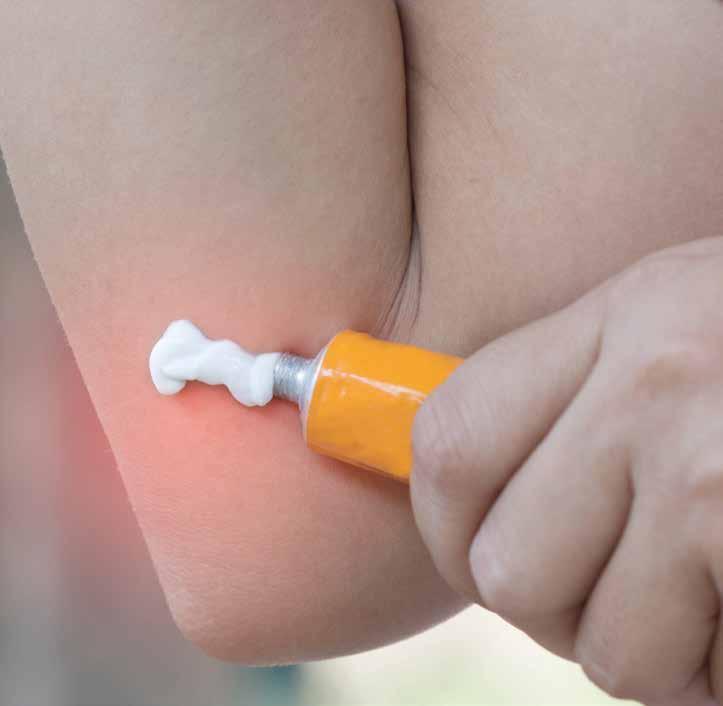ORAL HEALTH
53
ORAL HEALTH Given the recent trend in teeth whitening, oral health has become big business, and pharmacies are usually the first port of call. Patients are in need of more than just toothpaste, however, and improving oral hygiene is paramount and can prevent many illnesses from emerging. In addition to what you recommend, it is good to also provide trips on general oral hygiene. These tips include: • regularly (twice daily) brushing teeth and gums using a fluoride toothpaste • flossing between teeth using dental floss, dental tape, or interdental brushes • keeping the tongue clean (Gently brush the tongue a couple of times to remove bacteria and freshen breath when brushing teeth) In addition to those seeking good oral health, there will be patients who have already developed illnesses related to poor oral hygiene. The most common are Gingivitis and Halitosis. GINGIVITIS Gingivitis is a form of periodontal disease. Periodontal disease is the inflammation and infection that destroys the tissues, such as the gums, ligaments and the tooth sockets, which support the teeth. This is caused by a build-up of plaque over periods of time and is caused by poor dental hygiene, undiagnosed diabetes or a poor diet.
Who? Adults are more likely to present to the pharmacy with gingivitis, especially smokers, those with a poor diet and some experts believe women on some of the contraceptive pills may be extra-susceptible.
The disease can often remain silent for many years and will only present itself when the gums become swollen or bleed. Gum disease can result in teeth loss. Patients who smoke or suffer from diabetes are at a higher risk of developing the disease.
How long has the patient had the symptoms? Gingivitis can be present for years without the patient knowing.
If a patient presents with symptoms of gingivitis, they should have their teeth professionally cleaned and they should also be advised to practice good oral hygiene. In order to prevent a build-up of plaque, toothbrushes or water irrigation devices can be advised, along with anti-bacterial mouthwashes and anti-plaque or anti-tartar toothpastes. Soft bristle brushes should be used and the recommended time for cleaning the teeth is two minutes. Who? People, who have poor oral hygiene. The problem can affect anyone of any age. What are the symptoms? Bad breath How long has the patient had the symptoms? If the patient has persistent bad breath that cannot be resolved, it may be a symptom of another condition. A referral should be made to a doctor, dentist or health hygienist. Medication: Customers who express concern about sensitive teeth should choose a product formulated to reduce this.
What are the symptoms? Swollen or bleeding gums
Actions already taken? Patients may have already attended their dentist and are looking for pharmacy over-the-counter solutions. Medication: Customers who express concern about sensitive teeth should choose a product formulated to reduce this.
HALITOSIS Halitosis or bad breath can be caused by excessive amounts of volatile sulphur compounds (VSCs) being produced by bacteria in the mouth. This can be influenced by any number of factors, such as eating, drinking, oral hygiene, sleeping and the effect that these activities have on saliva flow. Mouthwashes will reduce halitosis, due to the anti-microbial influences of the products.
MOUTH ULCERS Mouth ulcers are painful sores inside the mouth that are not related to poor oral hygiene. They may occur on the tongue, the lining of the cheeks, the gums, the inside of the lips, or the soft palate on the back of the roof of your mouth. Common symptoms of mouth ulcers include the following: • A burning, tingling, or prickling sensation, up to 24 hours before the sore appears • Crater-like ulcers that are white, grey, or yellow in colour, with a red border • Sores are usually painful • Difficulty speaking, eating, or swallowing Over-the-counter pain medications such as ibuprofen, acetaminophen, or naproxen can be used to help with discomfort from mouth ulcers. Zinc lozenges or vitamins B and C may also help relieve symptoms. In addition, oral antiseptic rinses may aid in the healing of lesions. Sufferers should be advised to seek care from their GP if symptoms worsen, show no signs of improvement after 7 days of self-treatment, or do not heal in 14 days.
Who? Those suffering from mouth ulcers. What are the symptoms? Ranging from burning and tingling before sores appear, pain in the mouth. How long have they had symptoms? Symptoms will usually clear up within 7 days of treatment. Action already taken? Sufferers may already be aware of tell-tale signs. Medication: If using Ibuprofen avoid smoking or drinking large amounts of alcohol.






















